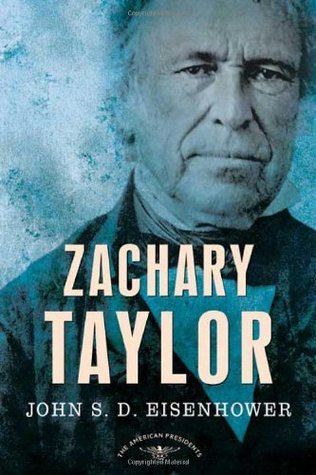Zachary Taylor
Zachary Taylor by John S.D. Eisenhower
Tier 4
Old Rough and Ready was the first president elected without having previously held political office. He was a lifelong soldier who vaulted into the national discourse following his heroics in the Mexican-American War. He was the first, but not the last American president to follow this path. He died early in this presidency (he only served for 16 months) and is seen historically as a largely forgettable president.
But, as we’ve learned so far, a president is not born the day he steps into the office. He carries a life with him, and Taylor’s life pre-presidency was reasonably interesting.
He was born in Virginia (an odd fact about the presidency is that seven of the first twelve presidents were born there) on a plantation. He joined the army in 1808 and found it suited him. He served during the War of 1812 to some acclaim and again performed admirably in the Black Hawk and Second Seminole wars, but it was the Mexican-American War that made his national reputation.
I discussed this war in my post on James K. Polk, but it never hurts for a quick refresher. The United States annexed the Republic of Texas (formerly part of Mexico), and everyone knew war was coming. It was during this period that Taylor was tasked with an important command. He was sent to Fort Jesup in Louisiana and told to guard against Mexican encroachments into the then-sovereign Republic of Texas. There was talk that this command should’ve gone to a more experienced commander, but they (Winfield Scott and Edmund Gaines notably) were Whigs, and President Polk was not. Taylor was largely apolitical at the time and, as such, was selected for the post. Polk later directed him to take troops into the Texas territory near the Rio Grande in anticipation of a Mexican offensive.
All of this clearly demonstrates the theater that was the buildup to the Mexican-American War. Texas was nominally independent but acted as a possession of the United States. The United States pretended they wanted to negotiate with Mexico when they wanted war. And Mexico was pretending that Texas was still their rightful property. Everyone was lying, and everyone knew it.
Taylor went on to win a spectacular victory at the Battle of Palo Alto, where he was vastly outnumbered. He was noted for humanely treating wounded and dead Mexican soldiers here, giving them the same treatment as American soldiers and proper burials for the dead. This may seem to you like the bare minimum, but I can assure you that this is rare in the annals of war.
He was then promoted to Major General, and comparisons to Washington and Jackson began, with a future eye to the White House. Taylor quickly shot down these rumors saying that he had no intention of seeking the presidency, which seems to have been true at the time.
There were a series of other victories in the War, and Taylor became a national hero. Both parties quickly courted him as, due to his apolitical nature and hatred of most politicians, no one knew where he fell on the political spectrum. In the end, his positions, combined with his hatred of President Polk, led him to declare himself a Whig and eventually win the nomination from that party. He would prove to be the last Whig to be elected president. From this election on, every president would be either a Democrat or a Republican. He was also the last Southerner elected until Woodrow Wilson.
His presidency was short and, due to his belief that the legislator should be the ones passing laws and the executive only there to veto unconstitutional ones, uneventful. The primary issue he had to deal with before his death was the sectional crisis.
The sectional crisis predated Taylor’s presidency and centered on slavery. Slavery was legal in the South and illegal in the North. Both sides understood that, given the construction of the US political system, every newly admitted state could alter the balance of power. This issue came to a front during Polk and Taylor’s presidencies. Several new states were slated to enter the union following the acquisition of the Oregon and Texas territories and the Mexican-American War.
Now, Taylor was a slaveowner, and the Southerners assumed he would support the expansion of slavery into the newly acquired Western territories. But they were wrong. It doesn’t seem that Taylor’s decision was moral but rather practical. He saw slavery as necessary for harvesting crops (notably cotton) in the South but didn’t see the Western territories as hospitable for that planting.
(Obviously, his decision does not absolve the fact that he owned other human beings, but it’s an integral part of his story.)
Once it became clear that he did not support the Southern states' wishes to expand slavery, they began to make noise of secession. Taylor, who had lived through more than one war and watched many young men die, was violently opposed to war. He attempted to strike a compromise but died during that effort.
Extensive conspiracy theorizing surrounds Taylor’s death, with some believing pro-slavery Southerners assassinated him. Unfortunately, there is very little evidence to support this claim. What seems to have happened is that he ate copious amounts of cherries and iced milk at an event, contracted dysentery, and died shortly after. His symptoms were likely exacerbated by the terrible medical practices of the time. Trust me, I’d love a conspiracy here, but there doesn’t seem to be one.
This biography was written by the son of a future General turned President, Dwight D. Eisenhower. It’s an adequate biography and works to show the reader the life of a man mostly forgotten in US history. He may not have been a remarkable president, but his time as a military officer was hugely impactful.
